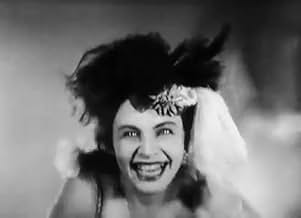अपनी भाषा में प्लॉट जोड़ेंIn the beginning of the industrial revolution, the Paris Commune was established in 1871 against the rich and the powerful, and violently repressed by the army that remained faithful to a ta... सभी पढ़ेंIn the beginning of the industrial revolution, the Paris Commune was established in 1871 against the rich and the powerful, and violently repressed by the army that remained faithful to a tamer form of Republicanism. How could the love story between a young sales girl and a soldi... सभी पढ़ेंIn the beginning of the industrial revolution, the Paris Commune was established in 1871 against the rich and the powerful, and violently repressed by the army that remained faithful to a tamer form of Republicanism. How could the love story between a young sales girl and a soldier unable to decide if he was pro or against the radical fashion? Two short months were ne... सभी पढ़ें
- निर्देशक
- लेखक
- स्टार
- Commune's Central Committee member
- (as A. Arnold)
फ़ीचर्ड समीक्षाएं
The setting itself is a fresh and interesting one, for once an ideological Soviet film is not set during 1917. However, since the depicted time period is that of international mayhem and confusion, the viewer who sits in cold, without first reading a little background, may have trouble understanding the context. Also the first half of this film, which is quasi-episodic in nature, is difficult to follow because of the artistic choices implemented by Kozintsev and Trauberg. The same problem can be found in their earlier adaptation of Gogol's "The Overcoat" called "Shinel" (1926), which also had trouble concentrating on the essential.
However the viewer would be wise to stick with the film, as the second half clarifies much, and as a narrative is much more interesting. Even the editing and cinematography improve during the most distressing sequences. The political message becomes clearer to read, to a point where the film-makers literally spell it out for you. The imagery is very vivid and thought-provoking, and the film that started out as a curiosity with a period setting ends up touching upon several ageless themes and questions.
Despite my sympathies, however, it is not the politics that I love about this film - it is not the message but the artful use of the medium that sells me on this work of art. This is a moving and beautiful film, with fully realised character development and wonderfully magical imagery. After the parasols, the train and the cancan dancers, you should keep an eye out in particular for the shots in the last segments of the film. Kozintsev and Trauberg work little miracles with everyday objects such as lace, shovels and pianos. (Amazingly enough, these artists continued their magic for a long time -Trauberg worked until the early 1960s and Kozintsev directed his last film, which many consider the best "King Lear" for the cinema, in 1971.) "New Babylon" is, in a number of ways, a good companion piece for "The Man with a Movie Camera", the best of the Russian silents that I have seen. While it does indulge the "message" shot - there are a number of those but most are extremely well-done and worth seeing; the milk-for-soldiers is one, the juxtaposed lives are another - it is the realism of this film that elevates it, not its occasional slip into histrionics. The female lead, Yelena Kuzmina, is excellent, an actress who commands your attention and earns your sympathy, but it is in all the secondary roles put together that the city of Paris of 1870 and 1871 truly comes alive. In these earlier films, before sound drew us in, it was the faces that needed to speak, and these do, eloquently. The department store owner, the old soldiers, the contemptuous general, the washerwomen and the journalist with hope for humanity, they are all clamoring to tell you something. Exactly what they say to you may depend on your own world view, but their comments should be interesting to everyone.
The opening sequence in itself is masterful. With the aid of special portrait lenses, the focus of images is extremely narrow--mostly, only a character in the foreground per shot is seen clearly--while the background is blurred as if each frame were an Impressionist painting--none of which remain on the screen for long. Counts of the film's average shot length (ASL) range from five seconds, according to Barry Salt, to as quick as 3.7 seconds, as claimed by David Bordwell and Kristin Thompson. Seeing several shots pass by in a fraction of a second at its fastest pace, I wasn't about to bring out my own clicker. Suffice to say that the shot succession here is closer to that of a modern action flick than to the contemporary early talkies in Hollywood, which seem to be guaranteed an ASL of more than 10 seconds and upwards of more than 20 seconds. Eventually, the camera will sometimes spin as if in a drunken stupor until hardly anything can be made out. Other imagery, such as when the rich attack the poor in the street, is also obfuscated visually and by quick cutting. Also undercutting what one might otherwise consider an appreciation of French Impressionist paintings is that the footage is of bourgeois debauchery, a grotesque depiction of the sort of leisurely activities one might find in a Manet, Monet, Renoir, or Surat.
Nor is the entirety of the picture photographed in quite the same way; indeed, there are a few striking deep-focus compositions. One features the French flag in the foreground, as a soldier on horseback occupies the distant horizon. The montage, too, slows down at least long enough to establish a relationship between a woman who joins the Commune and a French soldier who winds up being involved in its demise, including sometimes their relatively-long forlorn looks, the plot of which does rather well to ground the grander narrative and hold the spectator's attention with the traditional, character-based identification that's more important to other movies, but rather at odds with this film's socialist and non-individualistic politics. Set during the Franco-Prussian War, the Prussian soldiers, too, only occupy silhouettes in the background of the frame; the center of this picture is occupied by France's own class conflict. It should also be noted that the lighting, including some chiaroscuro effects throughout, is finely done.
While later we see those of the middle or upper classes lounging outside, watching the Commune being defeated by the soldiers as if it were street theatre, in the opening sequence it's an apparent operetta being performed on stage while they eat and drink and generally revel, or, for the more sober, conduct business. If these arts and entertainments are defined as bourgeois, then one might very well wonder what is supposed to be made of film, such as this one. That's where the guns that the proletariat fight for come in. Cinema as mechanical, rapid-fire, revolutionary polemic for mass production and mass appeal. The crosscutting between a new operetta being practiced and the working-class women feeding the soldiers before a struggle over weaponry ensues is an especially stark contrast. Furthermore, there's the piano player on the Commune's side of the barricade and, perhaps anachronistically, "La Marseillaise" being sung as the workers' battle cry, to go along with the rest of Shostakovich's score that's always fighting in unison with the class struggle of the imagery. Sure, it's Soviet propaganda, but it's also great art.
क्या आपको पता है
- ट्रिवियाComposer Dmitri Shostakovich wrote his first film score for this silent movie. He hurriedly wrote about 90 minutes of music.
- कनेक्शनEdited into Histoire(s) du cinéma: Une histoire seule (1989)
टॉप पसंद
विवरण
- रिलीज़ की तारीख़
- कंट्री ऑफ़ ओरिजिन
- भाषाएं
- इस रूप में भी जाना जाता है
- The New Babylon
- उत्पादन कंपनी
- IMDbPro पर और कंपनी क्रेडिट देखें
- चलने की अवधि
- 2 घं(120 min)
- रंग
- ध्वनि मिश्रण
- पक्ष अनुपात
- 1.33 : 1




























